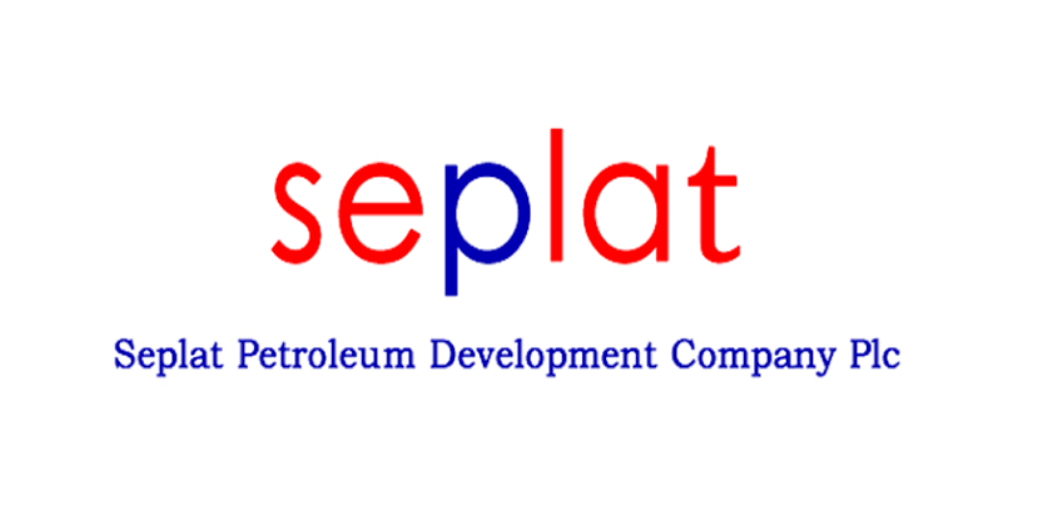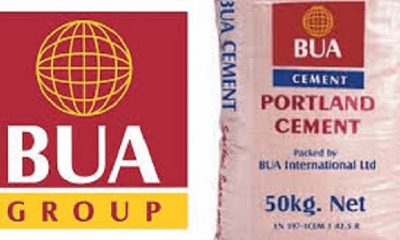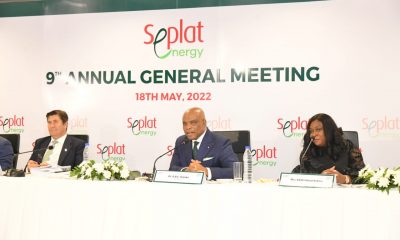Economy
Shareholders Authorise Board to Change Name to Seplat Energy

By Adedapo Adesanya
Shareholders of Seplat Petroleum Development Company Plc have unanimously approved the proposal presented by the board to change the name of the company to Seplat Energy Plc.
The board was authorised by the shareholders to go ahead with the name change at the company’s 8th Annual General Meeting (AGM) held recently.
The change of name is in line with the transition of the organisation into a full energy solutions company.
Speaking at the event, Mr ABC Orjiako, Chairman of the board of Seplat, said it was the responsibility of the board to plan for the long-term sustainability of the company, as scenario analysis on Seplat’s assets have been conducted under different climate change and demand scenarios.
According to him, Seplat looks forward to a future in which it is much more involved in promoting a low carbon environment in its operations, hence the adoption of the new name, Seplat Energy.
In his address to shareholders and other stakeholders during the AGM, Mr Orjiako said the company’s cash position remained strong in the full year of 2020 and the $318 million of cash it generated from operations was significantly more than the $150 million invested for future growth.
“Of this, our Eland assets contributed 8,855 barrels of oil per day (bopd) or 26 per cent of total liquid volumes. Our financial performance enabled us to maintain our commitment to paying dividends.
“While other companies were cutting back or cancelling payments for the 2019 financial year, because of prevailing uncertainties, we honoured our commitment and paid a final dividend of $0.05 for a total dividend of $0.10 for 2019.
“In October 2020, we announced an interim dividend of $0.05 and the board has since approved an additional top-up of $0.05, maintaining our $0.10 dividend for the 2020 financial year.
“Since we raised $535 million at our initial public offering in May 2014, we have returned $344 million to shareholders in the form of dividends.
“The strengthening of our board is part of our ongoing desire to achieve world-class governance of our company. Six of our 13-member board are independent and we continue to work towards increasing diversity.
“In addition, as we announced in March, we have taken the bold decision to eliminate all related-party transactions – a move that exceeds the requirements of the UK Code of Corporate Governance,” he said.
On his part, the CEO of Seplat, Mr Roger Brown, said “Nigeria’s per-capita energy consumption and carbon emissions are actually very low and its national electricity grid is still very poorly developed. This is why the country is so reliant on small-scale diesel generation to satisfy its energy needs and this is the problem we need to address most urgently.
“It’s important to recognise that Nigeria is a developing country with low access to energy and a rapidly growing young population. Hydrocarbons are the country’s main resource and provide significant help for its economy. The proceeds from the oil industry fund a wide range of Sustainable Development Goals (SDGs) and are crucial to the country’s societal development.
“Nigeria needs to achieve significant growth in its capacity to deliver education and health services, food production and energy security.
“Without the development of its indigenous oil and gas industry, these goals will become very difficult to achieve and so in Nigeria, the industry remains not just relevant but essential.”
He further said, “Seplat is embracing climate change opportunities on two fronts. Firstly, we continue to invest heavily in expanding our domestic gas business in line with the government’s strategy to achieve universal access to electricity and to make that energy cheaper and cleaner by replacing diesel generation, which is very damaging to the environment and the economy.
“Gas is clearly the next step for Nigeria, and we have a leading position domestically with the Nigerian Government declaring the ANOH project as one of the seven critical gas development projects for the country.
“Secondly, we have created a New Energy unit to focus on lower carbon to zero-carbon fuel sources and the natural extension beyond gas is for Seplat to participate in renewable energy, such as solar power, and in emerging technologies such as carbon capture and storage.
“Our view is that Nigeria will benefit from being able to deploy renewable energy on its electricity grid rather than solely developing an off-grid renewable solution. By providing a baseload of cheaper, lower carbon gas on the grid, the acceleration of grid-based renewables will be possible, which is why we are currently focusing on accelerating our midstream gas business and additionally expanding into LPG, which is a good fuel source for cooking, preventing deforestation.
“The priority for 2021 is to address our responsibilities as part of the global energy transition and to set realistic targets for how we as a company evolve to drive that transition along. Having survived the worst year in the history of the oil and gas industry, the actions we’ve taken before and during 2020 have left us in a position of strength and I am confident that as demand recovers and the imperative for gas increases, Seplat will exit 2021 a larger, stronger, more profitable company and strengthen its position as Nigeria’s indigenous energy leader.”
Adding his input, Mr Emeka Onwuka, Chief Financial Officer, Seplat, said the company’s robust financial performance in 2020 demonstrated the importance of a prudent approach to managing its finances, focusing on capital allocation, revenue diversification, cost control, hedging and debt management.
“Despite a challenging year, we repaid $100 million debt, invested $150 million for growth and maintained our dividend at $0.10 per share for the year.
“Financial sustainability begins with the decisions we make about capital allocation and the priorities we consider when using cash. Our aim has always been to maintain a healthy balance sheet, focusing on cash generation first and foremost so we can build up a large reserve for future deployment and protect ourselves against the kind of downturns the world experienced in 2020,” he said.
Economy
Stock Market Gains N2.367trn as All-Share Index Rises 2.06%

By Dipo Olowookere
The Nigerian Exchange (NGX) Limited appreciated by 2.06 per cent on Friday, amid a rush for local equities due to encouraging earnings of companies for 2025.
Business Post reports that the buying pressure was across the key sectors of Customs Street yesterday, with the banking index growing by 2.49 per cent. The energy industry appreciated by 2.05 per cent, the consumer goods counter grew by 0.78 per cent, the insurance space improved by 0.64 per cent, and the industrial goods sector expanded by 0.44 per cent.
At the close of trades, the market capitalisation went up by N2.367 trillion to N117.027 trillion from N114.660 trillion, and the All-Share Index (ASI) gained 3,687.45 points to close at 182,313.08 points compared with the previous day’s 178,625.63 points.
Cornerstone Insurance, Infinity Trust, and Nestle Nigeria appreciated by 10.00 per cent each to sell at N6.38, N9.90 and N2,662.00, respectively, while Okomu Oil rose by 9.99 per cent to N1,327.00, with RT Briscoe up by 9.97 per cent to N17.42.
Conversely, SAHCO depleted by 10.00 per cent to M135.00, Guinness Nigeria lost 9.97 per cent to trade at N103.00, Omatek shrank by 9.39 per cent to N2.99, NPF Microfinance Bank decreased by 6.51 per cent to N5.60, and eTranzact slipped by 6.33 per cent to N10.80.
A total of 53 stocks ended in the green side and 33 stocks finished in the red side, representing a positive market breadth index and strong investor sentiment.
Data showed that 936.4 million shares valued at N52.7 billion were transacted in 50,068 deals on Friday versus the 698.3 million shares worth N28.438 billion traded in 50,886 deals on Thursday, indicating a rise in the trading volume and value by 34.10 per cent, and 85.56 per cent apiece, and a slip in the number of deals by 1.61 per cent.
First Holdco closed the session as the most active equity with 106.3 million units worth N5.1 billion, Zenith Bank transacted 72.6 million units valued at N5.7 billion, United Capital traded 45.4 million units for N963.2 million, GTCO sold 45.0 million units worth N4.9 billion, and Fidelity Bank exchanged 31.4 million units valued at N639.0 million.
Economy
OTC Securities Exchange Extends Positive Run by 0.86%

By Adedapo Adesanya
The NASD Over-the-Counter (OTC) Securities Exchange rose further by 0.86 per cent on Friday, February 13, with the market capitalisation growing by N20.27 billion to N2.378 trillion from the previous session’s N2.357 trillion, and the NASD Unlisted Security Index (NSI) rising by 33.87 points to 3,974.77 points from the 3,940.90 points it ended a day earlier.
The improvement recorded by the bourse yesterday was influenced by six price gainers led by Okitipupa Plc, which went up by N18.00 to sell at N260.00 per share compared with the previous day’s N242.00 per share.
Further, Central Securities Clearing System (CSCS) Plc added N3.39 to quote at N80.47 per unit versus N77.08 per unit, IPWA Plc chalked by 31 Kobo to finish at N3.44 per share versus N3.13 per share, Lagos Building Investment Company (LBIC) Plc gained 31 Kobo to settle at N3.41 per unit versus N3.10 per unit, Afriland Properties Plc appreciated by 31 Kobo to N16.51 per share from N16.20 per share, and Food Concepts Plc increased by 8 Kobo to N3.28 per unit from N3.20 per unit.
There were three price losers, led by MRS Oil Plc, which weakened by N10.00 to close at N170.00 per share compared with Thursday’s price of N200.00 per share, FrieslandCampina Wamco Nigeria Plc lost N2.59 to sell for N65.52 per unit compared with the preceding session’s N68.10 per unit, and Geo-Fluids Plc depreciated by 33 Kobo to N3.30 per share from N3.63 per share.
During the session, the volume of securities transacted by the market participants went up by 9.5 per cent to 9.4 million units from 8.6 million units, the value increased by 1,206.5 per cent to N703.6 million from N53.9 million, and the number of deals grew by 7.1 per cent to 45 deals from 42 deals.
CSCS Plc remained the most traded stock by value (year-to-date) with 27.1 million units exchanged for N1.5 billion, followed by Resourcery Plc with 1.05 billion units traded at N408.6 million, and Geo-Fluids Plc with 29.9 million units valued at N152.6 million.
Resourcery Plc ended the day as the most traded stock by volume (year-to-date) with 1.05 billion units sold for N408.6 million, followed by Geo-Fluids Plc with 29.9 million worth N152.6 million, and CSCS Plc with 27.1 million units sold for N1.5 billion.
Economy
Naira Value Further Dips 0.13% to N1,355/$1

By Adedapo Adesanya
The Naira depreciated further against the United States Dollar by N1.76 or 0.13 per cent on Friday in the Nigerian Autonomous Foreign Exchange Market (NAFEX) to close at N1,33.42/$1, in contrast to the N1,353.66/$1 it was exchanged a day earlier.
However, the Naira appreciated against the Pound Sterling in the same market window yesterday by N5.05 to trade at N1,844.59 versus Thursday’s closing price of N1,849.64/£1, and against the Euro, it improved by 75 Kobo to quote at N1,60/€1 versus the previous day’s N1,608.68/€1.
At the GTBank FX desk, the domestic currency lost N6 on the US Dollar on Friday to settle at N1,365/$1 versus the preceding session’s N1,359/$1, and at the parallel market, it chalked up N10 to trade at N1,430/$1 versus the previous day’s N1,430/$1.
The weakening of the Nigerian currency in the official market happened as the Central Bank of Nigeria (CBN) refrained from intervening in the official window.
The FX supply side was eclipsed by growing demand for foreign payments. Exporters’ inflows, non-bank corporate supply, and other market participants’ contributions had enhanced the FX liquidity level.
Pressure came with the entry of all duly licensed Bureau De Change (BDCs) into the official foreign exchange, although there are indications that the move will help the Naira-US Dollar exchange value, as BDC operators have started approaching their banks to understand the operational modalities and framework for accessing Dollars.
As for the cryptocurrency market, benchmarked tokens improved as US interest rate futures on Friday raised odds of rate cuts by the Federal Reserve after a report that showed inflation rose less than expected in January.
Data showed the Consumer Price Index (CPI) rose 0.2 per cent last month after an unrevised 0.3 per cent gain in December, with Solana (SOL) up by 7.9 per cent to $85.17, and Ethereum (ETH) up by 6.5 per cent to trade at $2,059.78.
Further, Cardano (ADA) added 5.3 per cent to close at $0.2758, Ripple (XRP) jumped 5.1 per cent to $1.42, Bitcoin expanded by 4.8 per cent to $69,357.35, Litecoin (LTC) grew by 4.7 per cent to $55.27, Binance Coin (BNB) jumped 4.0 per cent to $621.88, and Dogecoin (DOGE) increased by 3.8 per cent to $0.0965, while the US Dollar Tether (USDT) and the US Dollar Coin (USDC) remained unchanged at $1.00 each.
-

 Feature/OPED6 years ago
Feature/OPED6 years agoDavos was Different this year
-
Travel/Tourism10 years ago
Lagos Seals Western Lodge Hotel In Ikorodu
-

 Showbiz3 years ago
Showbiz3 years agoEstranged Lover Releases Videos of Empress Njamah Bathing
-

 Banking8 years ago
Banking8 years agoSort Codes of GTBank Branches in Nigeria
-

 Economy3 years ago
Economy3 years agoSubsidy Removal: CNG at N130 Per Litre Cheaper Than Petrol—IPMAN
-

 Banking3 years ago
Banking3 years agoSort Codes of UBA Branches in Nigeria
-

 Banking3 years ago
Banking3 years agoFirst Bank Announces Planned Downtime
-

 Sports3 years ago
Sports3 years agoHighest Paid Nigerian Footballer – How Much Do Nigerian Footballers Earn



















